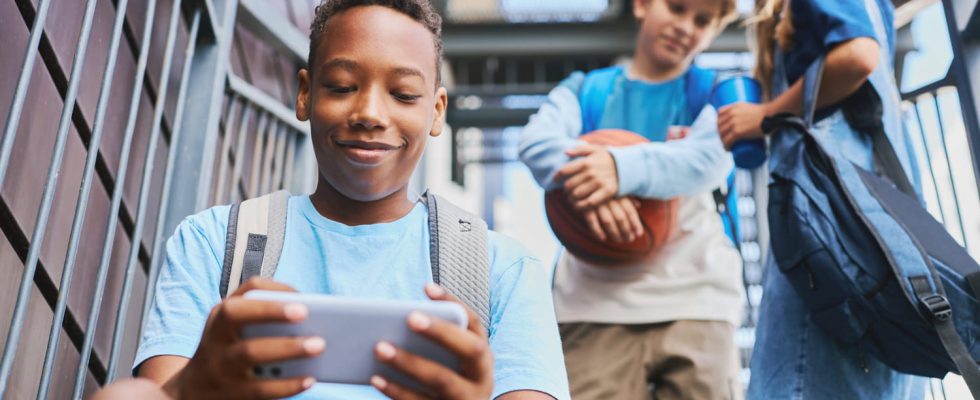Publishing photos of your children on the Internet and social networks is not without risk. For this summer, the association L’Enfant Bleu is launching a vast campaign to raise parents’ awareness of the dangers of “sharing”. Shedding light on this phenomenon, with the advice of Michaël Stora, psychologist.
“Sharing”. This term may not mean anything to you and yet, many parents today use this practice of share on social networks (Facebook, Instagram, Tiktok…) photos or videos of your children. During the summer, this phenomenon is particularly prevalent. Parents post without really thinking about the content of their children, naked or in swimsuits, without suspecting the dangers to which they expose them. This is why the association L’Enfant Bleu has decided to launch a vast prevention campaign for parents, in the public space and on social networks, with the release of the book The crazy adventure of Emma’s cuddly toy (Havas Edition), downloadable for free in e-book format or viewable on phones and tablets. What are the dangers of sharenting? What are the recommendations? Explanations and advice from Michaël Stora, psychologist and co-founder of the Observatory of Digital Worlds in the Humanities (OMNSH).
What is sharenting?
The term “sharenting” comes from the contraction in English of “sharing” which means to share, and “parenting” which is translated by parenthood. It is a practice which designates the fact of share photos or videos of their own children on the Internet and social networks. According to figures from the Parenting and Digital Education Observatory (OPEN), published on March 2, 2023, in France, 53% of parents have already posted content about their childand 91% of them did so between birth and the child was 5 years old.
What are the dangers of sharenting for children?
THE dangers of sharenting are real and numerous. Photos or videos of children, posted innocently by parents, can be hijacked by malicious people. According to data from National Center for Missing and Exploited Childrentaken back by The Blue Child Association, 50% of photos published on child pornography forums are images taken by parents and shared publicly on their social networks.
Some photos or videos may also be subject to identity theftor of cyber harassment.
To protect their children from the dangers of sharing, the association L’Enfant Bleu recommends that parents first of all share their children as little as possible on social networks. And if you decide to post photos or videos of your children, it is important to limit the scope of publications by configuring its networks. Parents can indeed play with privacy settings, whether the posts are private or public, whether the content can be seen by a few friends or only you, etc. On Facebook, for example, you can select “Friends” or “Me only” when you post. On instagram, the “Private account” box in “Account privacy” makes your posts visible only to your followers. As for tiktokyou also have the option to restrict your videos by clicking “Who can watch this video” when posting.
Psychologist Michaël Stora also advises families to:
- ask the kidsas soon as they are of age, if they allow their parents to put their image on social networks.
- Exchange photos within a restricted framework. “I advise them instead to favor private Whatsapp or Facebook groups where they can control who can see the photo. It’s a good way to exchange in a restricted setting”advocates Michaël Stora.
- Set an example for childrenbecause disseminating photos excessively does not help the child to judge what is good or bad to post on the Internet.
What does this overexposure of children to the Internet by their parents reflect?
Wanting to immortalize moments of life and show them to loved ones has always existed and remains a legitimate and fairly healthy reaction. On the other hand, sharing them excessively on social networks is different: “Facebook or Instagram are showcase social networks on which there is a democratization of the idealized image. In other words: we are not going to put just any photo there, to enhance ourselves and show a positive image of our life.“, explains the specialist. What is published on these networks would therefore not represent real life, but it would be platforms where the child would be considered as “parental narcissistic prolongationeven as a form of trophy“.
“Facebook or Instagram are showcases where the child is considered as a parental narcissistic extension, or a form of trophy.”
This phenomenon may also reveal a narcissistic fragility at the parent’s. For some, if this or that event is not photographed and shared on the networks, it is as if they did not exist. And above all, it is the gaze of others that takes precedence over everything. “Indeed, these publications are constantly liked and commented on. Recognition thus becomes proportional to the number of likes or other reactions (we can now comment on each photo with a sad, disgusted, laughing emoji…). It’s permanent judgment“, denounces the psychologist. While a pride or a joyful moment shared within the family unit should be enough to make people happy.
Same observation, on the Youtube channels who share the daily lives of children with their families. These same parents make benefits on the privacy of their children. “In this context, psychic bonds are not very healthy as some parents have views or blue thumbs goals.“, underlines the expert.
Thanks to the psychologist Michaël Stora, also co-founder of the Observatory of digital worlds in the human sciences (OMNSH).
- Exposing your child on the networks is not always giving him a gift… OPEN (March 2, 2023). : https://www.open-asso.org/actualite/2023/03/exposing-son-enfant-sur-les-reseaux-ce-nest-pas-toujours-lui-faire-un-cadeau/
- Parents, configuring your social networks well is protecting your children. The association L’Enfant Bleu. : https://enfantbleu.org/association/actions/sensibilisation/configuration-reseaux-sociaux-protection-enfant/
